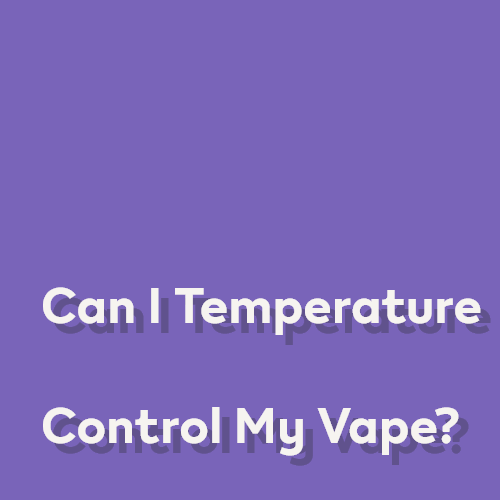You may not be aware, but there was a time that vapes were associated with burnt tastes and dry hits – unpleasant throat sensations that made switching away from cigarettes to a smoke-free e-cigarette challenging. Temperature Controlled (TC) vapes remedied this and helped to pave the way for more consistently satisfying experiences, without combustion. This article will dive into how and why vape temperature control has revolutionized the e-cigarette landscape.
First and foremost, a bit of background. With the introduction of temperature control vaping, so came a countermeasure to one of vaping’s most off-putting problems – a burnt taste and dry hits. The unsatisfying sensation of a dry hit can be described as less taste and less vapor than expected. Incidents like this are often the consequence of a dry coil. Keep on vaping with a dry coil and you’ll run the risk of a “burnt hit.” This is because when there is no, or insufficient e-liquid, the coil burns instead of vaporizing the liquid.
So, what is vape temperature control?
A TC vape is an e-cigarette that can moderate the maximum temperature of your device’s coil and change the power output accordingly. This prevents your coil from exceeding its temperature limit and burning.
Can I Temperature Control My Vape?
Every vape is different and temperature control technology is still a relatively new innovation in the last decade. Check out a device’s manufacturer guidance for the most accurate information, as it varies by device and brand. If you have a TC vape, you might have a few questions about how to properly use your device and what your temp control vape settings should look like.
What temperature should I vape at?
The best temperature to vape at comes down to personal preference, but we suggest starting at a lower temperature and seeing how it feels. Most importantly, we recommend that you do some personal research and take your time. If you don’t find the perfect temperature control vape settings straight away, continue your research.
What wattage should I vape at?
You may need to set the wattage if your TC vape does not automate it. Just like temperature, perhaps try your device’s wattage on its lowest setting. From here you can change things up and find an appropriate volume that suits you. The most innovative and up-to-date vapes will automate this process, but follow up on the manufacturer’s guidance if you’re uncertain
Do coil types and design matter?
The type and design of your vape’s coil matters. That’s because certain coils might not work within a temperature controlled vape. The best practice is to use the device as intended and avoid substituting in other components. It is not recommended to customize your device. Doing so may affect your vape’s performance. You should always follow the manufacturer’s instructions.
What is TCR mode?
Temperature Coefficient of Resistance (often referred to as TCR) mode is a factor within TC vapes. TCR is a value that defines how much resistance changes as the temperature increases. TCR vapes and TC vapes are the same things – TCR is part of what makes temperature control work – and while it might seem complicated as a first-time user, it is possible to use TC vapes without extensive knowledge on the matter.
When it comes to the best temp control vape settings, it’s really a personal preference. We always recommend using your vape as the manufacturer intends. Temperature control vape settings can be an important factor in maximizing your vape experience but why is this? And are there any downsides to TC vaping?
TC Vaping Pros
Taste is heavily impacted by the temperature of your vape’s coil. Temperature control minimizes the chance of any coil-related issues that could affect your vaping experience, namely burnt or dry hits. Consequently, TCR helps bring out the taste of your chosen e-liquid. But that’s not all.
Broken or damaged coils are often a guilty party when it comes to crackling and popping in vapes. These frustrating sounds can be a nuisance to you and those nearby. As vape temperature control helps protect your device’s coil, the risk of these sounds is reduced. Why not learn more about crackling and popping sounds in vapes? Keeping on top of the condition of your device’s coil can prevent them.
Temperature control helps preserve power and this can have a positive impact on your device’s battery. Less strain means that the battery is likely to last longer – meaning you won’t need to replace it as often.
Temperature control prolongs your coil’s life and ensures taste consistency with every vape. But are there any problems when it comes to TC vapes?
TC Vaping Cons
For some, there are downsides to temperature controlled vapes. This technology isn’t simple, and it means that you’ll need to invest some time to understand the different types of devices on offer. Not only that but gaining an understanding of the different coil types can go a long way in maximizing your TC vape experience. All of this can be awfully confusing to someone who’s just switched from cigarettes to vapes.
Fortunately, it’s possible to enjoy a temperature controlled vape without needing experience or expertise. Many vapes automate the process – and we recommend that you find a trusted brand that offers the experience that you want.
This article is for general information and educational purposes. Some of the information in this article is based on external, third-party sources and we make no representations or warranties of any kind regarding the accuracy, validity or completeness of such information.

